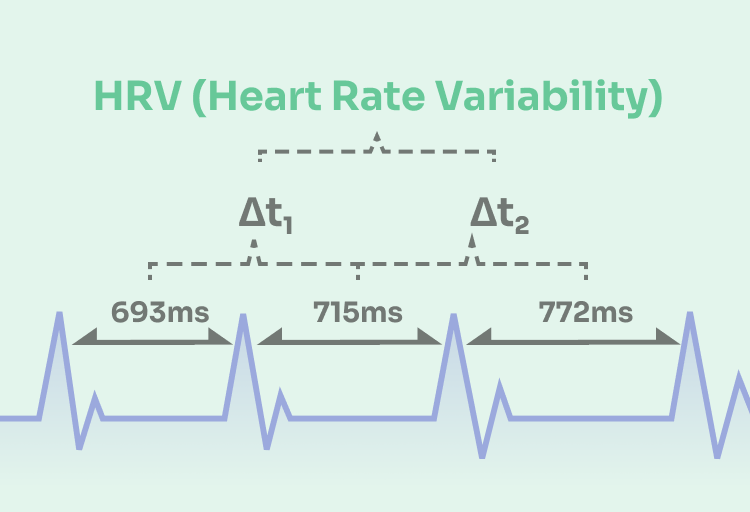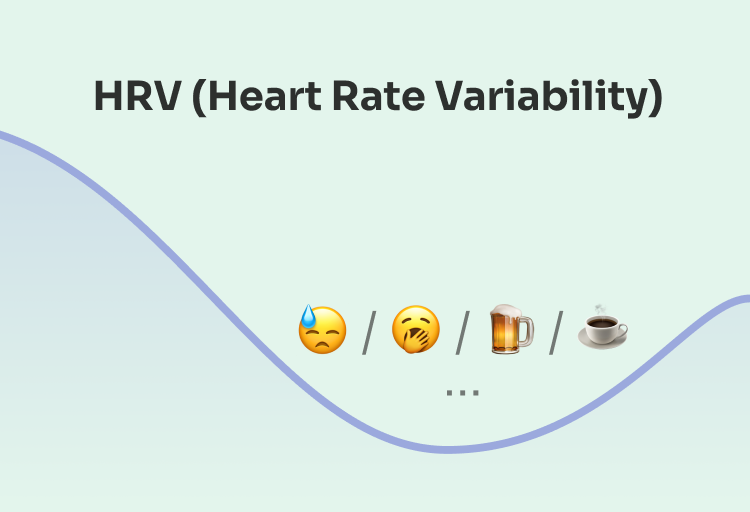¿Qué es la VFC? ¿Qué significa VFC?
¿Qué es la VFC?

La VFC (variabilidad de la frecuencia cardíaca) se refiere a las fluctuaciones naturales en los intervalos de tiempo entre los latidos del corazón durante un período de tiempo determinado. En otras palabras, mide el grado de variación entre los latidos del corazón. La VFC se considera un indicador fisiológico importante de la salud cardiovascular, la función del sistema nervioso autónomo y los niveles de estrés y recuperación.
La VFC está regulada tanto por el sistema nervioso simpático como por el parasimpático, que son responsables de activar y recuperar las funciones corporales, respectivamente. El sistema nervioso simpático participa en la respuesta al estrés o la tensión, mientras que el sistema nervioso parasimpático participa en el descanso y la digestión. Estos dos sistemas se equilibran entre sí y mantienen la homeostasis corporal.
Una VFC más alta suele indicar un mejor equilibrio del sistema nervioso autónomo y una mayor adaptabilidad del cuerpo, mientras que una VFC más baja puede indicar la influencia del estrés, la fatiga u otros problemas de salud.
Sin embargo, la VFC está influenciada por muchos factores, como la edad, el sexo, el estilo de vida y la genética, por lo que estos factores deben tenerse en cuenta al analizar la VFC. Al monitorear la VFC, las personas pueden obtener información sobre su adaptación al ejercicio, la recuperación y el estrés de la vida, lo que orienta las opciones de entrenamiento y estilo de vida más razonables desde el punto de vista científico.
¿Qué significa VFC? ¿Cómo se relaciona con el estrés?

La VFC se considera un índice que refleja la actividad del sistema nervioso autónomo, especialmente el equilibrio relativo entre los sistemas nerviosos simpático y parasimpático. El sistema nervioso simpático generalmente acelera la frecuencia cardíaca en respuesta al estrés y la amenaza, mientras que el sistema nervioso parasimpático la reduce durante la relajación y el descanso. Por lo tanto, una mayor variabilidad de la frecuencia cardíaca generalmente se considera un mejor desempeño de la flexibilidad del sistema nervioso autónomo, lo que refleja una mejor adaptabilidad de una persona al estrés.
Las investigaciones han encontrado un vínculo entre una menor variabilidad de la frecuencia cardíaca y niveles más altos de estrés y problemas de salud mental como la ansiedad y la depresión. La exposición prolongada a entornos de alto estrés y estrés emocional puede provocar un desequilibrio del sistema nervioso autónomo y niveles más bajos de variabilidad de la frecuencia cardíaca.
Cuando las personas están expuestas a entornos de alto estrés durante mucho tiempo, o están en un estado prolongado de estrés emocional, puede provocar un desequilibrio del sistema nervioso autónomo, que afecta los niveles de variabilidad de la frecuencia cardíaca. El sistema nervioso autónomo es una parte del sistema nervioso autónomo, que incluye los sistemas nerviosos simpático y parasimpático, que interactúan para regular el corazón. El sistema nervioso simpático es responsable de acelerar la frecuencia cardíaca y aumentar la respuesta del cuerpo al estrés en respuesta al estrés y la amenaza, mientras que el sistema nervioso parasimpático reduce la frecuencia cardíaca y promueve la recuperación y la reparación durante la relajación y el descanso.
En condiciones de alto estrés, el sistema nervioso simpático puede estar hiperactivado, mientras que el sistema nervioso parasimpático puede estar suprimido, lo que lleva a un desequilibrio del sistema nervioso autónomo. Esto puede resultar en una disminución de la variabilidad de la frecuencia cardíaca, es decir, una disminución de la variabilidad entre latidos cardíacos adyacentes. Se ha descubierto que una variabilidad de la frecuencia cardíaca más baja está asociada con problemas de salud mental, como ansiedad y depresión, así como con un mayor riesgo de algunos problemas de salud física, como enfermedades cardíacas y diabetes.
Por lo tanto, la variabilidad de la frecuencia cardíaca puede servir como un indicador biológico para evaluar el estrés y la función del sistema nervioso autónomo. Al monitorear y mejorar la variabilidad de la frecuencia cardíaca, las personas pueden comprender mejor su estado fisiológico, tomar medidas para controlar y reducir el estrés y promover la salud psicológica y fisiológica.
Referencias
- Shaffer, F., y Ginsberg, J. P. (2017). Una descripción general de las métricas y normas de variabilidad de la frecuencia cardíaca. Fronteras en salud pública, 258.
- Hye-Geum Kim, Eun-Jin Cheon, Dai-Seg Bai, Young Hwan Lee y Bon-Hoon Koo (2018). Estrés y variabilidad de la frecuencia cardíaca: un metaanálisis y una revisión de la literatura. Psychiatry Investig. 15(3): 235–245.
- J. P. A. Delaney y D. A. Brodie (2000). Efectos del estrés psicológico a corto plazo en los dominios de tiempo y frecuencia de la variabilidad de la frecuencia cardíaca, Sage Journals, volumen 91, número 2
- Mimma Nardelli; Gaetano Valenza; Alberto Greco; Antonio Lanata; Enzo Pasquale Scilingo (2015). Reconocimiento de emociones inducidas por sonidos afectivos a través de la variabilidad de la frecuencia cardíaca, IEEE Transactions on Affective Computing, Volumen: 6, Número: 4, 385 - 394